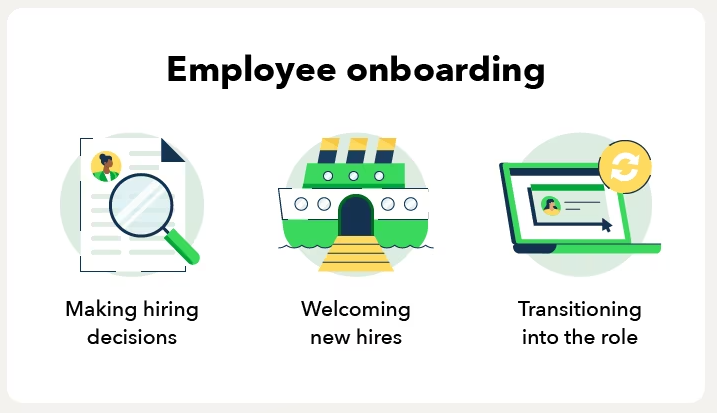Introduction:
Financial management is the backbone of any successful business, and QuickBooks has become synonymous with effective accounting and bookkeeping. To harness the full potential of this powerful tool, proper training and onboarding are essential. This article explores the significance of QuickBooks training, the onboarding process, and the benefits of mastering this robust accounting software.
Understanding QuickBooks
A. Introduction to QuickBooks
- Evolution and History:
QuickBooks, developed by Intuit, has evolved into a comprehensive accounting software since its inception. Launched in the early 1980s as a simple accounting tool for small businesses, it has undergone multiple updates and improvements over the years. The software has successfully adapted to the changing needs of businesses, incorporating advanced features and functionalities.
- Versions and Features:
QuickBooks offers a range of versions tailored to different business requirements. From the basic QuickBooks Online for small businesses to the more advanced QuickBooks Desktop Enterprise for larger enterprises, each version comes with specific features designed to streamline financial management. The software includes modules for invoicing, expense tracking, payroll, and reporting, ensuring a versatile toolkit for diverse accounting needs.
B. Advantages of QuickBooks
- Time and Cost Efficiency:
One of the key advantages of QuickBooks lies in its ability to save time and reduce costs for businesses. The automation of various accounting processes, such as invoicing and reconciliation, minimizes manual data entry. This not only increases the speed of financial tasks but also reduces the likelihood of errors. As a result, businesses can allocate resources more efficiently, focusing on strategic operations rather than labor-intensive accounting procedures.
- Accuracy and Error Reduction:
QuickBooks is renowned for its accuracy in financial calculations and data management. The software employs advanced algorithms that minimize the risk of human error in tasks like data entry and calculation. Real-time synchronization between various financial modules ensures that the information is consistent across the entire system, reducing discrepancies and promoting accurate financial reporting. This not only improves the reliability of financial data but also helps businesses make informed decisions based on precise information.
- Scalability for Businesses of All Sizes:
QuickBooks is designed to be scalable, making it suitable for businesses of all sizes. Whether you’re a sole proprietor, a small startup, or a large enterprise, QuickBooks offers versions and features that can be tailored to your specific needs. This scalability ensures that businesses can start with a basic version and seamlessly upgrade as they grow. It provides a flexible solution that adapts to the evolving requirements of businesses, making QuickBooks a long-term asset for financial management at any scale.
QuickBooks stands as a versatile and powerful accounting solution with a rich history of evolution. Its advantages in time and cost efficiency, accuracy, and scalability make it a valuable tool for businesses looking to streamline their financial processes and make informed decisions.
Importance of QuickBooks Training:
In the dynamic landscape of modern business, the proficiency of employees in utilizing financial tools is crucial for overall success. QuickBooks, as a widely-used accounting software, plays a pivotal role in streamlining financial processes. Recognizing the importance of QuickBooks training becomes imperative for businesses seeking to enhance their operational efficiency and financial accuracy.
The Role of Training in Business Success:
Empowering Employees:
QuickBooks training empowers employees by providing them with the knowledge and skills needed to navigate the software effectively. This empowerment translates into confidence and competence, fostering a more productive and capable workforce.
Increasing Productivity and Efficiency:
Training in QuickBooks equips employees with the ability to leverage the software’s features optimally. This leads to improved efficiency in managing financial data, reducing the time spent on repetitive tasks, and enhancing overall productivity within the organization.
Ensuring Compliance and Accuracy:
Accurate financial reporting is paramount for compliance with regulatory standards. QuickBooks training ensures that employees understand the software’s functionalities, reducing the likelihood of errors in financial records. This not only helps maintain compliance but also establishes a foundation for accurate decision-making.
Tailoring Training to Business Needs:
Industry-Specific Training:
Different industries have unique financial requirements. Tailoring QuickBooks training to specific industries ensures that employees grasp the nuances relevant to their business sector. This industry-specific approach enhances the applicability of the training, making it more valuable for day-to-day operations.
Customized Modules for Various Roles:
Recognizing that different roles within an organization have distinct responsibilities, customizing QuickBooks training modules based on job functions ensures relevance. For instance, the training for a financial analyst may differ from that of an accounts payable clerk, allowing each employee to focus on the features most pertinent to their responsibilities.
Advanced Training for Specialized Functions:
Some employees may be engaged in specialized financial functions that require in-depth knowledge of QuickBooks. Offering advanced training for these specialized roles ensures that employees are well-equipped to handle complex financial tasks, contributing to the overall competency of the finance team.
The importance of QuickBooks training lies in its ability to empower employees, increase productivity, ensure compliance, and tailor learning experiences to meet the unique needs of a business. By investing in comprehensive training programs, organizations can harness the full potential of QuickBooks, ultimately leading to improved financial management and business success.
QuickBooks Onboarding Process:
Setting Up QuickBooks Accounts
Setting up QuickBooks accounts is a crucial step in the onboarding process to ensure that the financial software aligns with the specific needs of the business.
Company Profile Creation: The onboarding process typically begins with the creation of the company profile in QuickBooks. This involves inputting fundamental information such as the business name, address, industry type, and fiscal year. Establishing a comprehensive company profile lays the foundation for accurate financial reporting and management within QuickBooks.
Chart of Accounts Customization: Customizing the chart of accounts is another essential aspect of QuickBooks setup. This involves tailoring the accounts to match the specific financial structure and reporting requirements of the business. By aligning the chart of accounts with the company’s unique needs, users can ensure that financial transactions are categorized accurately, facilitating streamlined bookkeeping and reporting.
Data Migration and Integration
Efficient data migration and integration processes are pivotal for a seamless transition to QuickBooks and the optimal utilization of its features.
Importing Existing Data: QuickBooks allows users to import existing financial data, such as transactions, customer and vendor lists, and historical financial records. This streamlines the onboarding process by preventing the need for manual data entry and ensuring that historical financial information is readily available within the software.
Integrating with Other Software: Businesses often use a variety of software tools for different aspects of their operations. QuickBooks onboarding may involve integrating the accounting software with other tools, such as CRM or inventory management systems. Integration enhances workflow efficiency by enabling the seamless flow of data between QuickBooks and other essential business applications.
Security and Permissions
Ensuring the security of financial data is paramount during the onboarding process, and QuickBooks provides robust features to address this concern.
User Roles and Permissions: QuickBooks allows for the creation of user roles with specific permissions, controlling access to sensitive financial information. Establishing user roles ensures that employees only have access to the information relevant to their roles, reducing the risk of unauthorized access or accidental modifications to critical financial data.
Multi-Factor Authentication: To enhance security further, businesses can implement multi-factor authentication for QuickBooks accounts. This additional layer of protection helps safeguard the system from unauthorized access by requiring users to provide multiple forms of identification before gaining entry.
Customizing for Business Needs
Tailoring QuickBooks settings to align with specific industry requirements and business processes is crucial for optimizing the software’s functionality.
Tailoring Settings to Industry Requirements: Different industries have unique accounting and reporting needs. QuickBooks allows users to customize settings to align with industry-specific requirements, ensuring that the software caters to the nuances of the business’s financial processes.
Adding and Customizing Fields: Businesses often have specific data points they want to track that may not be included in the default QuickBooks setup. Onboarding involves adding and customizing fields to capture additional information relevant to the business. This customization ensures that the software accommodates the diverse needs of different businesses.
The QuickBooks onboarding process involves a series of critical steps, from initial setup and data migration to addressing security concerns and tailoring the software to meet the unique needs of the business. A thorough onboarding process sets the stage for efficient financial management and reporting using the QuickBooks platform.
QuickBooks Training Modules:
QuickBooks Training Modules are structured to cater to a diverse audience with varying levels of expertise in accounting software. These modules provide a comprehensive learning experience, ensuring users are equipped with the necessary skills to efficiently navigate QuickBooks and leverage its features.
A. Basic Training for Beginners
The Basic Training module is tailored for beginners who are new to QuickBooks. It covers fundamental aspects such as navigating the interface, an essential skill for users to efficiently move through the software. Participants learn how to create and manage accounts, establishing a foundation for accurate financial record-keeping. Additionally, the module delves into the generation of basic reports, offering insights into the financial health of the business.
B. Intermediate Training for Advanced Users
Designed for those with a basic understanding of QuickBooks, the Intermediate Training module takes users to the next level. It explores advanced reporting and analytics features, allowing participants to extract in-depth insights into their financial data. Budgeting and forecasting become integral components, empowering advanced users to plan and strategize effectively. The module also delves into inventory management, a crucial aspect for businesses dealing with tangible goods.
C. Specialized Training for Industry-Specific Functions
Recognizing the diverse needs of different industries, the Specialized Training module caters to users requiring industry-specific knowledge. For the construction and project accounting sector, participants gain expertise in managing finances within the context of complex projects. Nonprofit accounting is covered, addressing the unique financial reporting and compliance requirements of nonprofit organizations. Retail and e-commerce accounting focus on the intricacies of managing finances in a sales-driven environment, considering factors like inventory turnover and sales tax.
These modules collectively offer a holistic learning experience, ensuring that users can harness the full potential of QuickBooks for their specific needs. Whether someone is just starting or seeking advanced insights and industry-specific knowledge, these training modules provide a structured pathway for mastering QuickBooks functionalities. The modular approach allows users to progress at their own pace, gaining confidence and proficiency in each aspect of the software.
Online vs. In-Person Training: A Comparative Analysis
Pros and Cons of Online Training
Flexibility and Accessibility:
Online training offers unparalleled flexibility as learners can access courses from anywhere with an internet connection. This is particularly advantageous for individuals with busy schedules or those seeking education beyond geographical constraints. Moreover, the asynchronous nature of online courses allows learners to progress at their own pace.
Interactive Learning Experiences:
Many online training platforms employ advanced technologies to create interactive and engaging learning experiences. Features like discussion forums, multimedia content, and virtual simulations enhance the educational process. However, the effectiveness of these elements may vary based on the course design and the learner’s preference for self-directed study.
Challenges and Limitations:
Despite its advantages, online training faces challenges such as limited face-to-face interaction, potential technical issues, and the need for self-discipline. Some learners may find it challenging to stay motivated or may miss the social aspects of traditional classroom settings.
Benefits and Drawbacks of In-Person Training
Hands-on Experience:
In-person training excels in providing hands-on experiences and practical learning opportunities. Workshops, laboratories, and real-world simulations are integral components of in-person training, enabling learners to apply theoretical knowledge directly. This tactile engagement can be particularly beneficial in fields requiring physical skills or equipment operation.
Personalized Attention:
One of the primary advantages of in-person training is the immediate access to instructors for personalized guidance. Learners can ask questions, seek clarification, and engage in discussions in real-time, fostering a deeper understanding of the subject matter. This personal touch contributes to a supportive learning environment.
Time and Location Constraints:
While in-person training offers immediacy, it comes with constraints related to time and location. Learners must adhere to set schedules, making it challenging for those with busy lifestyles or those residing in different time zones. Additionally, the need to physically attend classes may pose logistical challenges for individuals with mobility issues or other constraints.
The choice between online and in-person training depends on individual preferences, the nature of the subject matter, and the desired learning outcomes. Each mode of training has its own set of advantages and drawbacks, and understanding these factors is crucial for making informed decisions about educational pursuits.
Certification Programs and Continuing Education:
Certification Programs and Continuing Education play a crucial role in the professional development of individuals, particularly in fields like finance and accounting. In the realm of financial management, QuickBooks Certification stands out as a prominent example.
QuickBooks Certification Overview:
Types of Certifications:
QuickBooks offers a range of certifications tailored to different skill levels and professional roles. These may include certifications for QuickBooks Online, QuickBooks Desktop, and specialized certifications like QuickBooks ProAdvisor. Each certification caters to specific aspects of financial management, allowing individuals to demonstrate their expertise in particular areas.
Benefits of Certification for Individuals and Businesses:
Achieving QuickBooks Certification provides individuals with a competitive edge in the job market. Employers often prioritize candidates with recognized certifications as it signifies a certain level of proficiency in using the software. For businesses, having certified professionals on their team ensures a higher standard of financial management, potentially leading to improved efficiency and accuracy in financial processes.
Continuing Education and Skill Enhancement:
Staying Updated with Software Updates:
In the dynamic world of technology, software applications like QuickBooks undergo regular updates to introduce new features, enhance security, and improve overall functionality. Continuing education is essential for professionals to stay abreast of these changes. Regular training ensures that individuals are equipped to leverage the latest tools and functionalities offered by QuickBooks, thereby maximizing its potential for their businesses.
Advanced Training for Evolving Business Needs:
As businesses evolve, so do their financial management requirements. Continuing education allows professionals to undergo advanced training that addresses the evolving needs of the business landscape. This might include specialized courses on advanced reporting, complex financial analysis, or integration with other business software. By investing in ongoing education, individuals can adapt their skills to meet the challenges posed by an ever-changing business environment.
Certification Programs and Continuing Education in the context of QuickBooks offer a structured pathway for individuals to showcase their proficiency in financial management and adapt their skills to the evolving needs of businesses. The combination of certification and ongoing education ensures that professionals remain competitive, while businesses benefit from a workforce that is well-versed in the latest tools and strategies for effective financial management.
Overcoming Common Challenges in QuickBooks Training:
Resistance to Change:
One of the primary challenges in QuickBooks training is resistance to change. Employees may be accustomed to existing processes and might feel uneasy about adopting new software. Addressing employee concerns is crucial in overcoming this resistance. Conducting open discussions to understand their apprehensions and providing clear explanations about the advantages of using QuickBooks can help alleviate their fears. It’s essential to emphasize how QuickBooks can streamline workflows, enhance efficiency, and contribute to the overall success of the business.
Communicating the benefits of QuickBooks is equally important. Creating comprehensive training materials that highlight the positive impact on individual tasks, team collaboration, and organizational outcomes can motivate employees. Demonstrating real-life scenarios where QuickBooks has proven beneficial can make the transition more appealing and reduce resistance.
Data Accuracy and Integrity:
Maintaining data accuracy and integrity is paramount in financial software like QuickBooks. To address this challenge, organizations must implement best practices in data entry and management. This involves providing thorough training on data input procedures, including the importance of precision and consistency. Emphasizing the significance of accurate data in financial reporting and decision-making can encourage employees to prioritize data integrity.
Regular audits and reviews are essential components of ensuring data accuracy. Establishing a routine for periodic audits helps identify discrepancies or errors promptly. Training sessions on data review procedures and utilizing QuickBooks features for error detection can enhance the overall integrity of the financial data. By incorporating these practices, businesses can mitigate the risk of inaccuracies that could have significant repercussions.
Integration Issues with Other Software:
Integration issues with other software can hinder the seamless functioning of QuickBooks within an organization. Troubleshooting common integration problems is essential to ensure that QuickBooks can effectively collaborate with other tools and systems. Providing training on recognizing and resolving integration issues empowers users to troubleshoot minor problems independently.
When faced with complex integration challenges, seeking professional assistance becomes crucial. Training sessions should include guidance on identifying when external help is needed and the process of engaging with support services or IT professionals. Ensuring that employees understand the importance of timely resolution and have access to the resources required to address integration issues can prevent prolonged disruptions in the workflow.
Overcoming challenges in QuickBooks training requires a multifaceted approach. Addressing resistance to change, promoting data accuracy, and resolving integration issues are key aspects of successful implementation. By focusing on these areas through targeted training initiatives, organizations can optimize their use of QuickBooks and harness its full potential for financial management.
Future Trends in QuickBooks Training and Onboarding:
A. Artificial Intelligence and Automation:
In the realm of QuickBooks training and onboarding, a significant future trend involves the integration of Artificial Intelligence (AI) into financial processes. This entails leveraging advanced algorithms to enhance the efficiency and accuracy of tasks related to accounting and bookkeeping. AI can automate complex calculations, data analysis, and reporting, reducing the risk of human error and allowing users to focus on more strategic aspects of financial management.
Furthermore, the automation of routine tasks is poised to revolutionize QuickBooks training. As businesses increasingly adopt automated workflows, training programs will likely incorporate modules that teach users how to leverage automation features within QuickBooks. This includes setting up automated invoice generation, expense categorization, and other repetitive tasks, ultimately streamlining financial processes for businesses and their employees.
B. Cloud-Based Training Platforms:
Another noteworthy trend in QuickBooks training involves the widespread adoption of cloud-based learning platforms. These platforms offer numerous advantages, such as flexibility, scalability, and cost-effectiveness. Users can access training materials and resources from anywhere with an internet connection, fostering a more dynamic and accessible learning environment. This flexibility is particularly beneficial for businesses with remote or distributed teams, ensuring that employees can undergo QuickBooks training without geographical constraints.
Additionally, cloud-based platforms promote collaboration in the virtual space. QuickBooks users can interact with instructors and fellow learners, facilitating real-time discussions and problem-solving. This collaborative element enhances the overall learning experience, allowing users to share insights, tips, and best practices. As businesses continue to embrace remote work and virtual collaboration, the demand for cloud-based QuickBooks training platforms is likely to grow, providing a seamless and interactive learning experience for individuals and teams alike.
The future of QuickBooks training and onboarding is marked by the integration of AI and automation to enhance financial processes, as well as the widespread adoption of cloud-based platforms for flexible, accessible, and collaborative learning experiences. These trends reflect the evolving landscape of technology in the financial sector and the need for innovative training approaches to empower users in mastering QuickBooks and staying ahead in an increasingly digital world.









